Star Trek: The Next Generation/Characters
Main Cast (in order of billing)
Captain Jean-Luc Picard (Patrick Stewart)
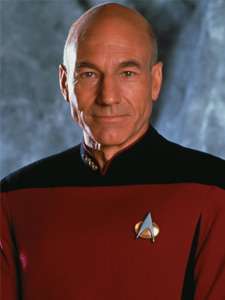
The bald Captain, and arguably the most iconic example of that trope (next to Kirk, of course).
Polymath, diplomat, and all-around gentleman, Picard at first seems like an incongruous choice to run a starship -- at least until somebody fires at his ship or disregards an order. Highly-cerebral and somewhat rigid in his duties, Picard occasionally acts coldly to his subordinates (a trait mirrored, aptly, by his artificial heart).
Of all the alien phenomena experienced by Picard, the principal ones that affect him are Q and the Borg; the former making a bet that his 'enlightened' principles won't hold up in the darkness of space, and the latter threatening to change him into a violent, vengeful man -- the very thing he despises.
- Adventurer Archaeologist: He studied archeology as a young man, and winds up going on adventures of this type in various episodes, like Captain's Holiday, The Chase, and Gambit.
- Badass
- Badass Grandpa: Not as over-the-top about it (except perhaps in the movies), but distinguishes himself by the number of Badass bases he covers -- Picard is the envy of younger men in ship combat, shooting, hand-to-hand, fencing (both classical and Klingon) and sheer endurance. He's not literally a badass grandpa, however-- in fact, he never married or had children (until the relaunch novels).
- Cultured Badass: He speaks French, and is well-versed in archaeology, literature, fencing and horseback riding.
- Bald of Awesome
- Berserk Button: Four.
- Don't ever try to directly harm his crew.
- Corruption in Starfleet. Those responsible will find at the very least their reputations ruined.
- Q in general. Mostly Played for Laughs.
- The Borg. Played for Drama and Nightmare Fuel. Enraged Picard is a frightening man.
- Benevolent Boss
- The Captain
- Catch Phrase: "Make it so."
- "Tea, Earl Grey, hot."
- "Engage."
- Child-Hater: A notable Subversion. Picard mentions in the pilot that he does not deal well with children. We later find that this is not dislike, but a discomfort that he sees as a personal flaw--he is far too used to dealing with supremely professional adults, and children also remind him of his own estranged family and his sacrifices for his career.
- In Generations he enters a Lotus Eater Machine and is actually given children of his own- he is so overwhelmed with joy he actually starts to cry. The machine in question- a space anomaly called the Nexus- only give him children because that was his deepest and most hidden desire.
- Cool Old Guy
- Face Palm: To memetic levels.
- Fake Nationality: Picard was born in France, but played by Patrick Stewart, who was born in England.
- Fantastic Racism: Towards the genetically engineered, as seen in "The Masterpiece Society". Might have something to do with the idea of built-in castes being way too reminiscent of the Borg.
- A Father to His Men / Team Dad
- Former Teen Rebel
- Guile Hero: Not the trickster kind, but he always prefers to resolve conflicts by diplomacy and finesse if possible, rather than resorting to combat.
- Grandpa, What Massive Hotness You Have: Patrick Stewart was 47 during the original run of TNG and looking good. During the last 20 minutes of Star Trek First Contact, he gives us a front-row seat to the gun show.
- Hates Small Talk: He'll do what he needs to avoid it. A good example is when Data attempts to make small talk with him and he directs the android to keep an eye on someone who was notorious for being big on small talk.
- The Hero
- Large Ham: Basically, Picard and Patrick Stewart have equal levels of ham content, considering that both are Shakespearian actors, but only one is in command of a powerful starship.
- Limited Advancement Opportunities: Kirk, Sisko, Janeway and Archer were all promoted over the course of their respective series or films. Picard, on the other hand, chose to stay a captain for the entirety of his career.
- It is mentioned in All Good Things that Picard eventually became an ambassador.
- The McCoy / The Spock: Depending on the situation.
- Misplaced Accent / Not Even Bothering with the Accent: Patrick Stewart apparently did attempt a French accent when he first tried out for the role, but it sounded too much like Inspector Clouseau and no one could take it seriously.
- Officer and a Gentleman
- Patrick Stewart Speech: His actor is the Trope Namer.
- Slap Slap Kiss: With Captain Phillipa Louvois in "The Measure of a Man".
- The Men First
- The So-Called Coward: Often got called this by more violently-minded enemies, due to his preference for diplomacy. He'd still steamroll over them if necessary, naturally.
- The Stoic: While he is pushed to his limits several times and he develops a Berserk Button about the Borg, Picard's reserve and emotional control are impressive enough that a Vulcan suffering from an age-related breakdown of self-control mind-links with him for stability.
- Trademark Favorite Drink: Tea. Earl Gray. Hot.
- Unresolved Sexual Tension: Picard has this with Beverly Crusher, by choice.
- Death of the Hypotenuse: Jack Crusher, Picard's best friend and Beverly's husband, was slain whilst serving on the USS Stargazer. Out of respect for him, they largely keep things to themselves.
Commander William Riker (Jonathan Frakes)
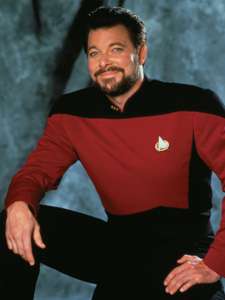
Riker: (after Q gives him two attractive women) I don't need your fantasy women!
Q: Oh, you're so stolid! You weren't like that before the beard!
The quintessential Number Two (or One). Started life as an expy of Kirk: a womanizing, cocksure space ace. With the beard, however, came a newfound gravitas and sense of responsibility. Fiercely loyal, he is probably the one officer whom Picard is most open with.
- Badass Beard: Specifically for naming Growing the Beard.
- Also a case of Throw It In. Frakes grew the beard during the summer hiatus and figured he'd shave it off before filming resumed. However, he made a convention appearance before then and fan response was very positive, and ultimately Gene Roddenberry requested he keep it.
- Boldly Coming
- Captain Morgan Pose: Just look at his picture. Used for practical reasons, since he is significantly taller than his castmates.
- Chivalrous Pervert
- I'll Be in My Bunk: Or more specifically, "I'll be in holodeck four!"
- Determinator: Data's analysis of his personality and record in "Peak Performance" that he will not give up, and that the weaker his position, the more aggressive will be his posture.
- Deuteragonist: Initially. Later eclipsed by Data.
- Guile Hero: Data notes that Riker is skilled at using "unusual cunning" and knowledge of his opponent to fool them. He relies on traditional tactics "only 21% of the time."
- The Kirk: Riker is a very interesting example of this trope. In short, Data will usually present a strictly rational solution to an ethical dilemma, while Crusher or Troi will present a more emotional one. Remember, usually they're people, not abstracts. At this point, Riker will weigh them internally and give his opinion to Picard, who then re-Kirks it and makes a decision. For a guy who hates bureaucratic admirals, he sure does like oversight.
- The Lancer: Part and parcel of being the ship's First Officer AKA "Number One."
- Limited Advancement Opportunities: By his own choice, no less. He was offered command several times during the series, but always turned them down because he would rather serve as first officer on the flagship than captain of an insignificant vessel [1]. He explains his reasoning behind this to Captain Picard in Part I of "The Best of Both Worlds": "With all due respect, sir, you need me." In Part II of that episode, he's given a field promotion to Captain after Picard's capture and has four pips on his uniform signifying his new rank, but after Picard's return he has three pips again for some reason. (No reason he couldn't have continued to serve as first officer while keeping his new rank. And after saving the Federation, he really deserved to keep that extra pip.) He finally accepts a promotion in Nemesis.
- Number One
- One of Us: It is revealed elsewhere that he has been known to work through dilemmas by historical LARPing.
- Recycled Script: He's based on Willard Decker from the cancelled series Star Trek: Phase II, which was turned into Star Trek the Motion Picture.
- Victorious Young Adulthood Friend: With Troi.
Lieutenant Commander Geordi La Forge (LeVar Burton)
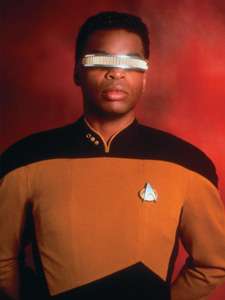
Engineering whiz and all-around Nice Guy. Born blind, he wears a spiffy VISOR which allow for some degree of sight. Geordi is most defined through his interactions with Data, who considers him his best friend.
- All Love Is Unrequited: He can never seem to get the girl.
- Aura Vision
- Black and Nerdy: Just like LeVar Burton.
- Blind Black Guy: To the point where it's his only unique quality.
- Blind Without'Em: Literally.
- Deadpan Snarker: More deadpan than snark.
- Disability Superpower
- Gadgeteer Genius
- Goggles Do Something Unusual: His VISOR allows him to "see" a lot of things that normal eyes can't.
- Electronic Eyes: In the movies, as of First Contact.
- Handicapped Badass
- Military Brat: Both parents were in Starfleet.
- Actor Shared Background: LeVar Burton himself is a son of a Sergeant.
- Mr. Fixit
- Techno Babble: Far from the only source of it in the show, but he could well be the poster boy for this trope.
- The Professor
- Throwing Off the Disability: His eyes and vision were completely regenerated in Insurrection because of the rejuvenating effects of the Ba'ku homeworld. This eliminated his disability.
- In "Hide and Q," the Q-empowered Riker grants Geordi eyesight. Though he briefly sees without his VISOR, he soon declines.
- Reportedly, it was suggested that this trope be invoked early into the series' run, with the justification being 24th century technology could simply cure his blindness. Both Burton and Roddenberry were against it - considering it a disservice to blind people.
- Translator Buddy
- Twofer Token Minority
Lieutenant Natasha "Tasha" Yar (Denise Crosby)
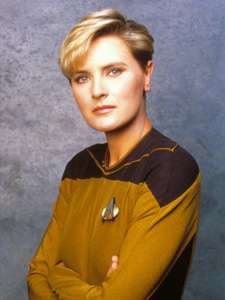
China O'Brien in space, and the original Worf, so to speak. Regularly got beaten up by the Monster of the Week, inevitably concluding with her getting killed by a slime monster. Death notwithstanding, she still popped up now and again in alternate timelines.
- Back for the Dead
- Back for the Finale
- Bridge Bunny: To Denise Crosby's displeasure.
- Dark and Troubled Past: She came from a planet that had descended into anarchy.
- Fan Service: Drunk Tasha wandering the ship; her "blitzed" voice is very seductive.
- Faux Action Girl: Despite being the informed Badass chief security officer of the Enterprise-D, Tasha is seldom shown in any combat situations, except against other female characters. This was generally understood at the time as the production practicing the Double Standard of not letting male characters beat on female characters on-screen. This (and the desire not to be pigeon-holed as just another Bridge Bunny) was one of the biggest reasons Denise Crosby wanted to leave the show. Fortunately, Tasha's Spiritual Successor Ensign Ro Laren (who actually replaced Wesley's position on the ship) proved to be an Action Girl who was anything but Faux.
- Hair of Gold
- Hot Amazon
- McLeaned
- The One Who Made It Out
- Sacrificial Lion
- That Didn't Happen: The night with Data. He agrees to keep it quiet, but we see that it's one of his most precious memories. (In an extended version of Yar's goodbye message, she says, "Data? It did happen.")
- Three Faces of Eve: Tasha was the seductress.
- Timey-Wimey Ball: As of "Yesterday's Enterprise".
- Vasquez Always Dies: This trope was not intended when the character was created, but Denise Crosby's desire to leave to show had this trope being played depressingly straight. Interestingly, she was originally modeled directly after Vasquez, originally being called "Macha Hernandez" before being renamed Tasha Yar.
- Even more interestingly, the role was read by dark-haired, olive-skinned Marina Sirtis, while Crosby read for the role of the ship's counselor. They swapped parts.
- We Hardly Knew Ye
- The Worf Effect: How Tasha died. This was one of the earlier examples of the trope on the series, even before Worf himself replaced Tasha as the chief security officer.
Lieutenant (later Lieutenant Commander) Worf (Michael Dorn)
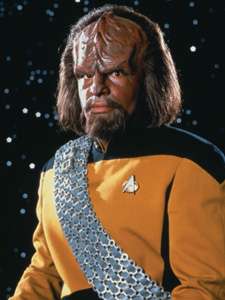
"I am not a merry man!"—Worf, "Q-Pid"
The genesis for Worf was Gene Roddenberry's suggestion that there be a "Klingon marine" on the Enterprise bridge, thus symbolizing that the human-Klingon feud was a thing of the past. Didn't quite work since it turned out he was actually raised by humans and was the only Klingon in all of Starfleet, and the Klingons--while no longer enemies--still had a pretty tense relationship with the Federation. But it did set up some very good and long-running storylines.
Of all the TNG regulars, Worf underwent the most Character Development, partially because his early characterization was minuscule, and partially because the character has appeared in more episodes of the series than any other. Over the years, he thwarted a civil war on his homeworld (and got exiled for his trouble), became a father, got beat up (a lot), broke his spine (luckily he had a spare), got married to Troi (in an alternate dimension), crossed over to Deep Space Nine, was promoted to Commander, got married again, and eventually cleared his name (finally) and became a Klingon ambassador.
- The Big Guy
- Big Screwed-Up Family: SF Debris puts it best: ("The Bonding")
Jeremy: Your parents?
Worf: No, they're dead.
Jeremy: Your wife?
Worf: First or second? ..Oh, nevermind, they're both dead.
Jeremy: Your brother?
Worf: He's not dead. But only because they stopped me from killing him.
Jeremy: HUH??
Worf: It was for his own good.
Jeremy: Any children?
Worf: Only the son who shames me.
- Birthday Hater: Worf doesn't look forward to his birthday as he doesn't like to be surprised, and knows that his shipmates always want to throw him a surprise party.
- The Comically Serious: The series' go-to for this type of humor.
- The Complainer Is Always Wrong: Exhibit A.
- Culture Blind: Subverted. Worf isn't ignorant of Earth culture, but he compensates for his "neither here nor there" upbringing by sticking doggedly to Klingon ideals. The few things he is comically unaware of (Gilbert and Sullivan, prune juice as a home remedy) are ones that a 24th-century man could easily miss. Oddly enough in his dogged attachment to Klingon ideals he seems blind to much of the Klingon culture that doesn't really follow them.
- It's even been mentioned that some of his virtues are based more off his human upbringing; his modesty, some of his morals, loyalties and even idealized aspects of Klingon culture have basis in human values. Even when these are brought up, he seems to ignore just where he might have picked it up.
- Deadpan Snarker: It's not overt, but Worf gets a bunch of really great snarks out over the course of the series.
Q: I have no powers! What must I do to convince you of that?
Worf: Die.
- Delivery Guy: "The computer simulation was not like this. The delivery was very orderly."
- Drink Order: PRUNE JUICE! EXTRA LARGE!
- Hates Small Talk
- I Am X, Son of Y: "I am Worf, son of Mogh!!"
- Momma's Boy: Worf absolutely loves his adoptive mother Helena Rozhenko. He insists that she makes the best Rokeg blood pie in the entire galaxy, beat up five teenage boys he deemed "disrespectful" to her (with the implication that they had insulted her rather than him) at the age of 7, and one of his favorite places is her home of Minsk.
- Offered the Crown: Subverted. The Duras sisters attempt to convince him to change his loyalty to them, offering the older sister as his wife and him the Regency for their nephew. Later, after defeating Gowron in DS9, he had, per Klingon Promotion, the right to lead the Klingon Empire, but gives the job away.
- Proud Warrior Race Guy
- Raised by Orcs: Inversion -- a Klingon raised by humans. In a fairly effective Deconstruction of the trope, Worf was often more true to Klingon principles and culture than most Klingons, due to having had more of an incentive to stand up for his identity in an alien environment.
- Also because he didn't grow up in a Klingon environment, Worf is only aware of how Klingons are supposed to conduct themselves -- other Klingons have learnt (as we all do) that there's honor and then there's the subtle compromises you make to get along in life. This leads to several Honor Before Reason decisions by Worf.
- Roaring Rampage of Revenge: When Duras killed his beloved K'Ehleyr, Worf boarded his ship and killed him in the Rite of Vengeance.
- Russian Guy Suffers Most: Worf, suffer of The Worf Effect, was Raised by Russians.
- Scarf of Asskicking: His metal baldric, which is rather out of place with the rest of his outfit. It's explained in one of the novels Worf would prefer to wear actual armor, and in deference to his cultural background the Federation allowed him to wear the baldric with his uniform as a compromise.
- The Stoic: Most of the time -- that is, unlike most Klingons. This was explained in Deep Space Nine as being the result of constant self-control after he accidentally killed a human friend whilst playing football as a child. The only time this image cracks is when he slips into Unstoppable Rage.
- This was explained in "Heart of Glory", TNG's first Klingon-centric episode.
- Token Heroic Orc
- The Worf Effect: The Trope Namer, of course.
- You Can't Go Home Again: At least until later, Worf was disgraced and exiled from Klingon space. Twice.
Doctor (Commander) Beverly Crusher (Gates McFadden)
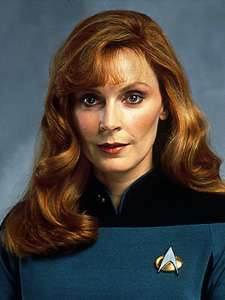
"He's Jean-Luc Picard, and if he wants to go on one more mission, that's what we're going to do."—Beverly, "All Good Things..."
The redhead (later blonde) Doctor in charge of Sickbay. Has a long and complicated relationship with Picard, who served over her late husband, Jack Crusher, as Captain of the ill-fated Stargazer. Picard, still troubled with guilt over Jack's death, often expresses romantic feelings toward Beverly, but will not act on them. Jack and Beverly had a son, Wesley, who lives aboard the Enterprise.
Seven years and four movies later, there's not much to say about Dr. Crusher. Probably the most-neglected character in the TNG roster.
- Action Mom
- The Cast Showoff: Gates McFadden made her name as a choreographer and, in "Data's Day," Crusher gets a scene where she teaches Data to dance, opening with a fairly impressive bit of tap-dancing from the doctor.
- Combat Medic: One of the more prominent examples among Trek doctors, she's quite able and willing to shoot a phaser or throw a punch, and does surprisingly well when she's forced by circumstance to command the ship in a fight. In fact, she likes command and regularly commands the night shift "just to keep in practice."
- Fiery Redhead: Although she has yet to approach the levels of this seen in, say, Kira Nerys, this trope comes into full effect when anyone tries to stop her from doing what she sees as her job.
Riker: (as Picard contemplates beaming Crusher back aboard despite her insistence on staying behind to treat wounded civilians) I don't wanna be in the Transporter Room to greet her.
- Hot Mom: Her figure was mentioned in her original character description. In-story, she was certainly a draw, between UST with Picard and several one-episode romance plots.
- Mama Bear: Her reaction when Lore threatens to kill Wesley in "Datalore".
- The McCoy: Slips into this on occasion.
- The Medic
- Put On A Shuttlecraft: Was absent from the show during the entire second season, when Dr. Pulaski was the doctor in her place.
- Satellite Character: Her initial description in the cast bible is a one line description of how she is Wesley's mother. Her other major character usage is UST with Picard. This contributed to her bus trip in season two.
- Three Faces of Eve: Beverly is the wife/mother.
- Unresolved Sexual Tension: With Picard. Ironically, even though it's Picard who has hang-ups about a romantic relationship, she shoots him down when he asks. They get over themselves in the novels.
Counselor (Commander) Deanna Troi (Marina Sirtis)
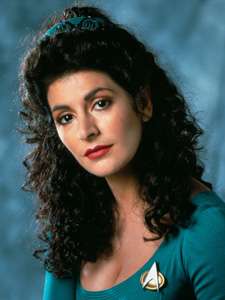
"I am the Goddess of Empathy. Cast off your inhibitions and embrace love, truth, joy."—Barclay's hologram of Troi
Half-Betazoid counselor who gets to sit right up front on The Bridge -- a remnant of the touchy-feely 80s. Somewhat justified by her empathic abilities, which allowed her to detect lies and therefore give an edge to Picard in negotiations (though she mostly just stated the obvious). After a few seasons of this, complaints arose from the actress (and the audience); happily, those criticisms were echoed by Captain Jellico, who promptly barked at Troi to change into a proper uniform.
As promised, Troi gained a less-revealing outfit, a phaser, and moved into the Counselors' office to assist the crew in more concrete ways. Troi is also notable for her very, very meddlesome mother (Lwaxana) and her on-again, off-again relationship with Riker. By the final TNG movie, the pair reconciled and got hitched.
- Captain Crash
- Captain Obvious: On a level that makes her The Scrappy to some.
- The Chick
- The Confidant: Part of her job, but even so.
- Custom Uniform of Sexy: Averted in the final season, when she started wearing a standard blue science uniform after Captain Jellico ordered her to. Some horny nerds wept and others thought she looked even better.
- Dark Chick
- The Empath
- Ethical Slut: Troi has the most romantic subplots of any character in the series (almost none of which outlast the episode), but they're almost always positive and mostly just serve to show how compassionate she is.
- Everything's Better with Chocolate: The resident chocoholic.
- The Fashionista: Deanna dresses fashionably (within Starfleet regulations as permitted), and is shown early in the series to have what others consider excellent taste in clothes. Unlike her mother Lwaxana, Deanna is more humble about it, unflamboyantly letting her outfits speak for themselves as she does her job.
- Fleeting Passionate Hobby: In "A Fistful of Datas" Alexander invites her because "she like Westerns." This is never mentioned again.
- She did mention that she liked westerns again briefly.
- The Expanded Universe establishes that her late human father was a fan of westerns, justifying it as one of the things she remembers enjoying with him when she was a child before he died.
- Genre Savvy
- Green-Skinned Space Babe: Although not actually green-skinned; she was half-Betazoid.
- Not often noticed is her lack of colored irises. Her eyes are all black.
- Half-Human Hybrid
- Human Aliens: Both she herself and full-blooded Betazoids like her mother Lwaxana.
- Impossibly Low Neckline: Her informal blue outfit (shown here) comes close. But her grey, purple and red informal outfits had a more modest V-shaped neckline. Her standard Starfleet uniform (worn in the series pilot and in Season 7) did not show cleavage at all.
- Limited Wardrobe
- Living Lie Detector
- Ms. Fanservice: And how. She sported prominent cleavage and a raging cameltoe for most of the series.
- Raven Hair, Ivory Skin
- Recycled Script: Based on Ilia from Star Trek: Phase II (which was cancelled and re-worked into Star Trek the Motion Picture).
- Sensor Character
- Serious Business:
Deanna: Chocolate is a serious thing.
- Three Faces of Eve: Troi is the child.
- Took a Level In Badass: "Face of the Enemy".
- ...also known as The Good Troi Episode.
- The Watson: Sadly often used to ask questions to which any Starfleet officer, even a directly-commissioned shrink, should know the answer, but the audience may not.
- Women Drivers: Very adept at crashing the Federation flagship into things. We'll ignore the time she was told to.
Lieutenant Commander Data (Brent Spiner)
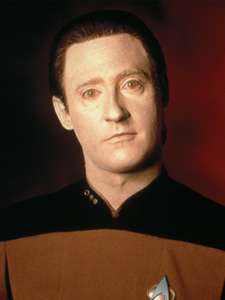
I have often wished to be human. I study people carefully, in order to more closely approximate human behavior.
Gold-skinned android who serves as a helmsan aboard the Enterprise. Though his presence was fairly inexplicable in the beginning, he was soon revealed to have been built by an eccentric scientist, who perished and left Data alone on a space colony. Upon his retrieval by Starfleet, Data reasoned that his natural path was to enroll in Starfleet Academy.
Data's popularity and presence on the show eventually grew to rival Nimoy's, so much so that Brent Spiner (who gamely carried many episodes) began to the feel the strain by year seven. In addition, he was prominently featured in three out of the four TNG films.
- Amazing Metallic Android: Pale goldish skin-tone.
- Badass Automaton
- Bizarre Alien Biology: The technological equivalent, in particular the location of his 'off switch' and the fact that his head can be removed and still function without his body.
- A Boy and His X: More like An Android And His Cat.
- Cannot Tell a Joke: One of Data's many attempts to become more human involves him trying to understand the nature of humor. He enlists the help of a holodeck comedian program and memorizes all the jokes... then proceeds to completely botch the delivery of every one.
- Ironically, this made him one of the funniest characters.
- Custom Uniform: In several episodes, Data's uniform has a decidedly greener tint than the gold of the standard Operations.
- Deuteragonist: Replaced Riker in this role after he emerged as the Ensemble Darkhorse, and remained so for the rest of the series (and especially in the movies).
- Do-Anything Robot: Culminating in Data acting as a flotation device ("In the event of a water landing...") in the movies.
- Evil Twin: Has one named Lore.
- Eyes of Gold
- Fantastic Racism / What Measure Is A Non-Organic: Often the target of this.
- Hyper Awareness
- Kindhearted Cat Lover: Data adores his cat Spot. Not only is he shown holding and cuddling her several times, he went so far as to compose a poem about her. In Real Life, Brent Spiner dislikes cats.
- Meaningful Name: Data's manner is dispassionate and matter-of-fact, contrasted with Lore's emotionality and spontaneity.
- Minored in Asskicking
- No Sense of Humor: Not for lack of trying, though. The guy named his cat "Spot", for crying out loud.
- Oblivious to Love: Kind of. He has a conceptual understanding of it.
- The Other Darrin: Not him -- Spot. Yep. Data's first feline friend was a long-haired Somali, while later ones are played by generic short-haired tabby.
- This has caused some Trek authorities to joke that Spot is a shapeshifter in disguise, or else lost his fur in a transporter accident.
- Pinocchio Syndrome
- Precision F-Strike: Two.
- In Generations, as the Enterprise is crashing, Data says what everyone's thinking:
- In First Contact:
- Recycled Script: He is derived from the character Xon from the cancelled Star Trek: Phase 2. Xon was a full-blooded Vulcan, the idea being that he would provide a contrast to the vanished Spock--whereas Spock was always denying his human side and embracing his Vulcan, Xon would already be secure in his Vulcan-ness and thus be more intrigued and curious about understanding human emotions. This eventually mutated into the idea of an emotionless android seeking to achieve those human emotions.
- Ridiculously Human Robot: Justified Trope. His creator was far more interested in the puzzle of creating fully-sentient mechanical life than any commercial applications.
- Skunk Stripe: A flash-forward to the future ("All Good Things...") shows Data with a glaringly-obvious streak of grey hair, an attempt to make himself feel older and distinguished.
- The Smart Guy
- The Spock: Even The McCoy thinks so.
Admiral McCoy: I don't see any points on your ears, boy, but you sound like a Vulcan!
Data: No sir, I am an android.
Admiral McCoy: Almost as bad.
- Tin Man: He was actually called this a few times during the series, the most memorable of which was in that ridiculous episode with the sentient, evil sludge.
- Truly Single Parent: To Lal.
- Unable to Cry: As in, physically unable to, despite losing his daughter.
- Averted in Generations after he gets his emotion chip.
- Brought up in "Brothers."
Data: You know that I cannot grieve for you, sir.
Dr. Soong: You will, in your own way.
- Also seen in "Skin of Evil", but like seen in the previous example, he does grieve, in his own way.
Data: I find my thoughts are not for Tasha, but for myself. I keep thinking how empty it will be without her presence. Did I miss the point?
Picard: No... no, you didn't, Data. You got it.
- Uncanny Valley: This trope is regularly deliberately invoked as Data tries and fails to adequately simulate human behavior.
- Unfortunately, it also made it difficult for Spiner to continue to play the role, as he aged and Data didn't.
- Verbal Tic: Does not use contractions. This becomes key to telling him apart from Lore.
- There are a few slips in this early on thanks to Early Installment Weirdness.
Ensign Wesley Crusher (Wil Wheaton)
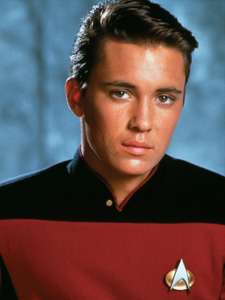
A much-maligned, much-hated character in his prime, Wesley was inserted into the series by Gene Roddenberry as a wunderkind who saves the ship single-handedly from week to week. Unfortunately, his precocious attitude and infallible genius did not ingratiate him with many viewers.
As he grew older, Welsey became a more likable Audience Surrogate. He enrolled in Starfleet Academy, becoming a sort of surrogate son to Picard. Despite this, Wesley began to question the dogmas of the Federation, which he saw as hypocritical. Like Ro Laren, he left Starfleet after finding himself on the opposing side of the Maquis issue.
- Always Someone Better: Despite everything said below, he was still beaten into the Academy by his Benzite colleague Mordock.
- Author Avatar: For Gene Wesley Roddenberry.
- Even in real life, Roddenberry considered Wheaton Like a Son to Me. When Wesley enrolled in the Academy, Roddenberry commemorated it by presenting his old Air Force medal to Wheaton as a gift.
- Evil Genius: Seems to be at times, when he doesn't bother to explain himself.
- Although in his case, it was more like Accidental Evil Genius thanks to his science experiments. In one episode, his nanotech experiment almost destroyed the ship and, in another, he managed to get his mom trapped in a space/time bubble after a test on the warp drive, which nearly killed her as it collapsed in on itself.
- Kid Appeal Character: He ticks all of the boxes.
- Intelligence Equals Isolation
- Military Brat: Son of a Starfleet doctor and command officer.
- Put On A Shuttlecraft
- Teen Genius
- What Could Have Been: At one point he was planned as a female character named Leslie Crusher, as the TNG creators thought the teenaged boy genius was too much of a cliché. (They were probably right.)
Recurring Crew and Dependents (in alphabetical order)
Lieutenant Reginald Barclay (Dwight Schultz)
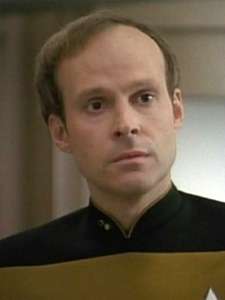
Cloudcuckoolander and social basketcase who serves aboard the Enterprise as engineer. Has logged more holodeck hours than even Riker himself; in fact, Barclay practically lives on the holodeck, which renders him useful whenever some quirky Holodeck Malfunction happens. Barclay later turned up on Voyager, where his holodeck OCD somehow led to a communications breakthrough, allowing Starfleet to detect Janeway's stranded crew.
It can be safety said that Barclay is more at ease around computers than people. Unsurprisingly, his closest friend ended up being Dr. Zimmerman, taciturn and antisocial creator of the EMH.
- Brain Critical Mass: In "The Nth Degree," Barclay's brain is taken over by an ancient race from the center of the galaxy, greatly increasing his intellect. Under their influence, Barclay seizes command of the Enterprise, controlling the ship with his mind.
- Bunny Ears Lawyer: Extremely good at his job on the Enterprise, whenever they can keep him out of the holodeck.
- Covert Pervert: His private Fan Service simulations of Dr. Crusher and Counselor Troi.
- Daydream Surprise: His first scene. And then he exits the Holodeck.
- Embarrassing Nickname: Ensign Crusher dubbed him "Lt. Broccoli" in his introductory episode. Eventually abandoned, but not before Captain Picard uses in in a Freudian Slip directly to his face. He corrected himself, but the damage was already done.
- Hypochondria: Did an attempted self diagnosis in "Realm of Fear" due to something he saw when in the transporter, and how it affected him.
- Kicked Upstairs: From his previous assignment to the Enterprise; his former CO had been giving him glowing performance evaluations specifically to bait another captain into requesting him.
- Mr. Imagination: Mostly through holodiction as he's always generating new fantasy simulations on the holodeck.
- A Day in the Limelight / Once a Season: Generally he has an episode revolving entirely around him.
- Overly Long Name: His full name is Reginald Endicott Barclay III.
- Reassignment Backfire: Originally moved to the Enterprise just to get rid of him, Barclay came into his own as a Starfleet officer under Picard's command.
- Shrinking Violet
- Stuttering Into Eloquence
- Took a Level In Badass: In Voyager, where he's pretty much single-handedly responsible for getting the Voyager home.
Guinan (Whoopi Goldberg)
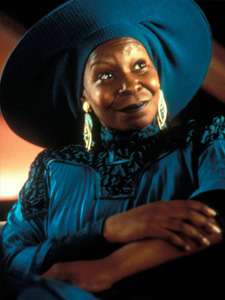
Wise and mysterious bartender with a big hat. Guinan manages the Ten Forward lounge, but her history with Picard goes back way further than that. Contrary to appearance, she is one of the last survivors of an ageless and inscrutable species who were scattered by the Borg. Most of her past remains murky; she harbors no love for Q, and is possibly the one person he truly fears. In the TNG films, Guinan is revealed to have once been trapped in the Nexus.
- The Bartender: To many characters, but frequently to Jean-Luc.
- BFG: Keeps one behind the bar to break up particularly nasty bar fights.
- The Confidant
- Have We Met Yet?: 19th-century Guinan meets first a time-displaced Data, then Picard, while in San Francisco, both of whom (obviously) know her.
- Mysterious Past: Guinan often refers to adventures from her past, several of which become important plot points, but many more of which remain mysterious.
- Nice Hat: Guinan is always wearing a hat. Even when she's been shot in 19th-century San Francisco. Even when she's a Living Memory in the Nexus. The only time she's seen without a hat is in her quarters in Generations.
- Promoted Fangirl: Whoopi Goldberg was a huge fan of the original series and has specifically named Nichelle Nichols as her inspiration for acting. Just before the second season entered production, she called Roddenberry, saying "I am a Star Trek fan, I was a Star Trek fan long before I was ever Whoopi Goldberg and I'm wondering if there's some part I can play in your show?" Roddenberry was so impressed that he re-wrote the bartender character he had intended to introduce for Goldberg.
- Shout-Out: Named after famed speakeasy owner and entertainer Texas Guinan.
- Really Seven Hundred Years Old: Guinan looks exactly the same in the late 24th century as she does in the late 19th.
- Whoopi Epiphany Speech: Several times, but most notably to Riker in "The Best of Both Worlds".
Keiko Ishikawa O'Brien (Rosalind Chao)
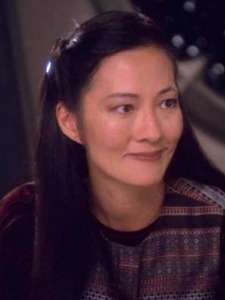
A botanist who worked in the Enterprise arboretum. Later introduced to her eventual husband, Miles O'Brien, through matchmaker Data. As the most stable family unit on Star Trek, the O'Briens nonetheless had their share of problems. A majority of "O'Brien Must Suffer" episodes revolve around Keiko and/or Molly being placed in imminent peril.
When O'Brien left to join Deep Space Nine, Keiko and their daughter Molly came with him. Keiko opened a children's school on the station.
- Born in An Elevator: Gave birth to her daughter Molly in the ship's lounge in the midst of a crisis. With Worf delivering the baby.
- Fake Nationality: Keiko is from Japan; Rosalind Chao is Chinese-American.
- Put On A Shuttlecraft: To Deep Space Nine along with her husband Miles.
- Yamato Nadeshiko
Transporter Chief Miles O'Brien (Colm Meaney)
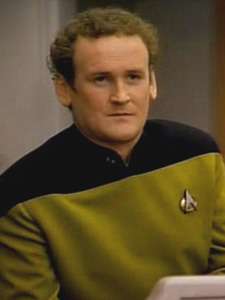
Suspiciously Similar Substitute to Scotty, put in charge of the transporter room. A veteran of numerous never-seen wars, most notably the Cardassian conflict, which lands him squarely on the idealogical side of the Maquis. Unlike Ro Laren and Wesley, though, he stayed true to the uniform.
O'Brien later transferred to Deep Space Nine as its chief engineer. Though his character growth was limited, he was featured much more prominently on a show in which even an extra got his own episode at some point. He's also the only member of Starfleet ever depicted to be enlisted.
- Ascended Extra: He went from a named extra in the pilot to a recurring minor character to a main character on Deep Space Nine.
- Happily Married: To Keiko, during an otherwise Data-centric episode.
- Retcon: Over the course of the series, O'Brien's Starfleet rank fluctuated from low-ranking officer to high-ranking NCO.
- Put On A Shuttlecraft: To Deep Space Nine. His family left with him.
- The Engineer: Specializing in transporter technology.
Molly O'Brien (Tadeski twins, Hana Hatae)

O'Brien's first child. Had the dubious honor of being delivered by Worf. (Her baby brother, Kirayoshi O'Brien, is born under similarly weird circumstances.)
About the most exciting thing to happen to Molly was her Plot-Relevant Age-Up on Deep Space Nine, quickly undone by the Reset Button.
- The Other Darrin
- Put On A Shuttlecraft: To Deep Space Nine along with her father Miles.
- Soap Opera Rapid Aging Syndrome
Nurse (Ensign, later Lieutenant) Alyssa Ogawa (Patti Yasutake)
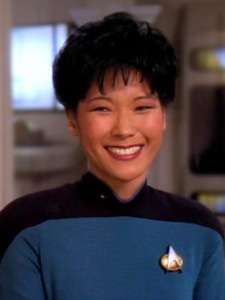
Dr. Crusher's assistant in sickbay, and a frequent Red Shirt (though she survived each ordeal).
- Fake Guest Star: She appeared a lot during the series.
- Genki Girl: She's one of the most bubbly characters in the series.
- Lower Deck Episode: Of the (non-main-characters-who-do-everything) group of friends in "Lower Decks", she's the only character to appear in more than two episodes.
- Mauve Shirt: But never killed off.
Doctor (Commander) Katherine Pulaski (Diana Muldaur)
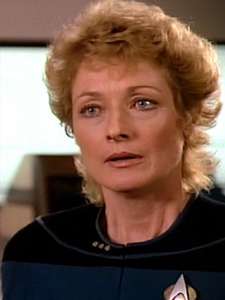
When Gates McFadden briefly quit the show in its second season, Pulaski was brought on to replace her. An expy of Dr. McCoy, Pulaski had an adversarial relationship with Data, whom she treats like an uppity office appliance.
The trouble with this dynamic was that, unlike Bones, Pulaski had no philosophical viewpoint to differ herself from Data. She was, simply put, a Luddite.[2]
Pulaski was dropped from TNG with little fanfare, and replaced with Crusher again.
- Chuck Cunningham Syndrome: When McFadden returned for Season 3, Pulaski dropped off the face of the galaxy with her last episode being an underwhelming Clip Show. She is mentioned in two further TNG episodes and the finale of Voyager (being paged at Starfleet Medical), and shows up in the Star Trek Expanded Universe more than once.
- What's surprising is that when the holographic Moriarty returns in Season Six, he doesn't ask where Pulaski has gone. She was the one he spent the most time with, after all, so you would think that if anybody would mention her, he would.
- Dr. Jerk
- Expy / Gender Flip: If McCoy ever had a character more blatantly patterned after him, it was Dr. Pulaski.
- Fake Guest Star: Always a guest through season two, despite being in most episodes and being such an important role on the ship. Diana Muldaur was actually offered main cast billing, but she turned it down.
- Fantastic Racism: Towards Data. He doesn't react, but it infuriates Geordi and Wesley.
- The McCoy: Was put in Season Two by Executive Meddling to be even more like McCoy than Dr. Crusher -- essentially McCoy's Gender Flip.
- And the actress appeared in two episodes (in different roles) with the original.
- Suspiciously Similar Substitute: For Dr. McCoy.
Ensign Ro Laren (Michelle Forbes)
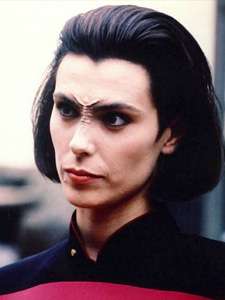
Bajoran officer and child of the Cardassian occupation of her homeworld. Has a chip on her shoulder the size of Wyoming, as well as a rebellious attitude toward protocol (indicated by her earrings, which clash with Starfleet dress code). Basically, a Breakout Character if ever there was one.
When the Maquis started attacking Cardassian settlements in open violation of Federation treaties, Laren was hand-picked to infiltrate their group. It soon became clear that her fondness for Picard did not measure up to her hatred of the Cardassians. Picard noticed this and warned Laren of the consequences of defection, even ordering Riker to stay on top of her. Laren easily overpowered Riker and sabotaged her own sting operation, officially joining the Maquis in the process.
Ro Laren's popularity made her the subject of not one but two Suspiciously-Similar Substitutes. The creators of Deep Space Nine tried to write her in as a regular, as did Voyager, but in both cases Michelle Forbes was unwilling to commit to a television series. The character was reworked into Kira Nerys and B'Elanna Torres, respectively.
- Action Girl
- Anti-Hero
- The Atoner
- Belligerent Sexual Tension: Spends most of the series being yelled at by Riker, due to a tendency to ignore procedure.
- They Do: When the crew of the Enterprise has their memories blocked, Ro concludes that they were having an affair and acts on it.
- Dark and Troubled Past
- Defrosting Ice Queen
- Elites Are More Glamorous: Ro seemed to get a lot more respect (which is to say, any) from the Enterprise crew after she returned from Starfleet Advanced Tactical Training.
- Face Heel Turn
- Fake Guest Star
- Five-Man Band: Either The Lancer or the Sixth Ranger, depending on the episode.
- Hot Amazon
- I Did What I Had to Do
- Kuudere
- Shoot the Dog
- Spiritual Successor: To Tasha Yar.
- Suspiciously Similar Substitute: Alternately played straight and Averted Trope hard. Ro was very similar to Yar in terms of history and personality, occupying her niche in the emotional dynamic of the show, but she was nothing like Wesley, whose position she took in the bridge crew.
- What the Hell, Hero?
Alexander Rozhenko (John Steuer, Brian Bonsall)
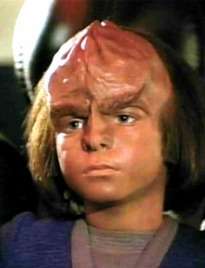
"I don't want to be a warrior!"
Illegitimate son of Worf and K'Ehleyr, a Klingon ambassador. Worf was not even aware of Alexander's birth until he was grown. Worf sent him away to be raised by his foster grandparents on Earth, no doubt scrambling Alexander's sense of identity even more. A year later, he was shipped back off to the Enterprise.
Worf, who had suppressed his Klingon tendencies for most of his life, perversely wanted Alexander to follow the honorable Klingon tradition. Though the pair always end up reconciling, their relationship stays more or less tumultuous, even on Deep Space Nine.
- The Other Darrin
- Quarter Human Hybrid: 3/4 Klingon, 1/4 Human.
- My Father's Species Doth Protest Too Much
- Soap Opera Rapid Aging Syndrome: Alexander was born in 2366, but when he arrives on the Enterprise in 2367, he is played by 6-year-old Jon Paul Steuer. Upon his return a year later he's played by 11-year-old Brian Bonsall. And when he shows up again in DS 9, it's 2374 and he's 8 years old... and played by 21-year-old Marc Worden. Maybe being 3/4ths Klingon does crazy things to your physiology? Will Miral Paris age super-slowly?
Other Recurring Characters (in alphabetical order)
Duras (Patrick Massett)
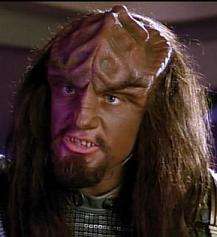
A Klingon politician whose father was a rival of Worf's before the Khitomer Massacre in which both men were killed, due to Duras' father betraying his people to the Romulans. When this information is discovered years later, Duras persuades the Klingon High Council to blame Worf's father instead of his (since he's powerful enough to start a civil war in the Empire if they don't do what he wants). This sets Worf up to be stigmatized and, under Klingon law, executed as the son of a traitor. When Worf challenges this, Duras not only does everything he can to make Worf's father look guilty, but also attempts to have Worf's brother and Picard assassinated for supporting him. In the end, after Worf and Picard learn the truth, Worf agrees to accept discommendation in order to keep the Empire from falling apart; this means that he admits his guilt and accepts lifelong ostracization from all other Klingons. Worf, quite understandably, holds a grudge against Duras for this.
Later, Duras is suspected of poisoning the Klingon head of state and his former co-conspirator in burying the truth about Khitomer, K'mpec, in order to usurp K'mpec's position. This is an extremely dishonorable method of killing among the Proud Warrior Race of Klingons, and K'mpec urges Picard to not only determine who should succeed him, but discover whether Duras or another Klingon in a position to succeed him--Gowron--did the deed, as anybody who would do such a thing cannot be trusted to rule the Empire. Duras not only attempts to have Gowron killed with a bomb, but does kill Worf's love interest, K'Ehleyr, when the latter starts digging into his past and accuses him of being the son of a traitor and framing Worf. Worf, upon finding K'ehleyr near death and learning that Duras is responsible, goes after Duras and kills him in single combat.
This wouldn't be the end of the Duras family causing trouble, though, as he had a couple of sisters who picked up right where he left off...
- Dirty Coward: By Klingon standards, anyway. Duras doesn't run away when Worf challenges him to a fight, which can be considered brave, but he does try to get out of fighting Gowron for leadership of the Empire by trying to have Gowron killed with a bomb. He also often uses assassins to dispatch his enemies instead of doing his own dirty work, notably when he tries to have Worf's brother Kurn killed; Duras gives Kurn an ultimatum, and then when Kurn turns him down Duras walks away to safety and leaves his men to dispatch Kurn. The only exception to this is when he goes to face K'ehleyr, who was apparently no match for him. During his fight against Worf, he tries to convince Worf not to kill him by saying that he's the only one who can ever prove Worf's innocence and he can't do that if he's dead. The cherry on top would be if he were the one who poisoned K'mpec; it's never determined one way or the other, but we later find out that the only other suspect, Gowron, seems to be above such tactics.
- Frame-Up: What he tries to do to Worf.
- In the Blood: Turns out that Duras was collaborating with the Romulans before his death, just like his father did.
- Jerkass: Dear lord, is he ever. Not content to just thank his lucky stars that he isn't being condemned as the son of a traitor, he does everything he can to insult, demean, and smear the guy who is condemned as such, Worf. That would be enough by itself, and when combined with his evil actions he becomes an ULTRA Jerkass.
- Karmic Death
- Killed Off for Real: By Worf.
- Leave No Witnesses: He tried very hard to make sure everybody who knew his dirty little secret was dead.
- Minored in Asskicking: While usually too much of a Dirty Coward to fight when he doesn't have to, his performance against Worf shows that he's a pretty good with a sword.
- Smug Snake
- Would Hit a Girl: Would beat her to death because she knows too much, in fact.
The Duras Sisters -- Lursa and B'Etor (Barbara March and Gwynyth Walsh)
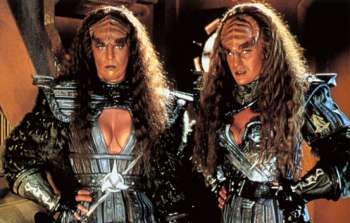
A pair of Klingon troublemakers who consider themselves entitled to rule the Empire. They are the sisters of the late Duras, and they try to get their brother's illegitimate son installed as ruler of the Empire. This touched off the Klingon Civil War, which Picard put a quick stop to, resulting in Gowron's consolidation of power. The duo later turned up on Deep Space Nine, selling guns to the Maquis to recoup their losses.
The Duras sisters are (to date) the latest Klingon adversaries to be faced in a Trek feature film, famously blowing up the Enterprise-D. Riker blew up their ship in kind.
- Cleavage Window
- Killed Off for Real: In Generations.
- The Man Behind the Man: This is what they wanted to set themselves up as; being female, neither of them would be allowed to rule the Klingon Empire. Their nephew was allowed to make a claim to the position, being male, but he was nothing more than their puppet.
- The Quisling: They are happy to sell out the Klingon Empire to the Romulans for their support in their attempted power-grab.
- Those Two Bad Guys: We never seem to see them apart.
- We Can Rule Together
Gowron (Robert O'Reilly)
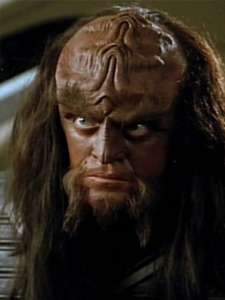
A crafty Klingon politician who slowly works his way up to Chancellor. Though some of his intimates (such as Martok) despair of Gowron's dwindled thirst for war, his moderate stance has aided the Federation more times than not.
Gowron eventually succumbed to the call for war on Deep Space Nine. With the Dominion running amok and attacking Klingon outposts, the Klingons went on the offensive, threatening to blow apart the Federation-Klingon alliance. Eventually, it turned out that Gowron's advisor, Martok, had been replaced by a Changeling who was the real root of the problem.
Unfortunately, the Dominion War fed into Gowron's megalomania, which become an impediment to the war effort. Worf defeated him in a fight to the death, transferring his leadership to the more-deserving (real, non-Changeling) Martok.
- Authority Equals Asskicking: A significant aversion, among a race known for the trope. As time goes on, we see that he is unremarkable as both a duellist and a strategist. He certinly won't back down from a fight, though.
- Even if it's with the second coming of Kahless. He seemed pretty sure that Kahless was a fraud, but still...
- Driven by Envy: His undoing. He gets jealous of the attention and glory heaped on general Martok in the Dominion War, and pushes him aside to take command and that glory for himself. Disaster ensues.
- Jerkass
- Karmic Death: Worf kills him because he abuses his position as Chancellor; the only reason he got the job in the first place was because Worf killed his corrupt rival during the election.
- The Napoleon: He's quite compact for a Klingon. Which may explain why he styles his hair like Diana Ross.
- Obstructive Bureaucrat
- Slasher Smile: "You will die slowly... Duras."
Hugh (Jonathan Del Arco)
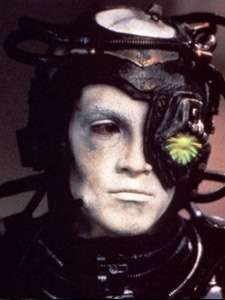
A stranded Borg drone who was recovered by the Enterprise. While Geordi worked to rehabilitate him, Picard schemed to reintroduce Hugh into the Borg collective along with a fatal computer virus. Eventually, Picard realized that Hugh had been changed by his interactions with the crew, and had developed a will of his own. It was hoped that by sending Hugh back to his people, he would contaminate the collective not with a virus, but with a sense of understanding (which is almost worse).
As expected, Hugh's reentry into the Borg caused all sorts of havoc. He and his fellow drones formed a splinter collective, but were co-opted by Lore, who lured them with the promising of restoring order. With the Enterprise's help, Hugh overthrew Lore and took his place as leader.
- My Species Doth Protest Too Much: He rejects the Borg motto of 'Resistance is Futile" and instead comes to beieve that "Resistance is NOT futile."
- Rogue Drone: An individual Borg.
- Punny Name: He didn't get pronouns at first, so they named him "Hugh" because it sounds like "you".
Captain Edward Jellico (Ronny Cox)
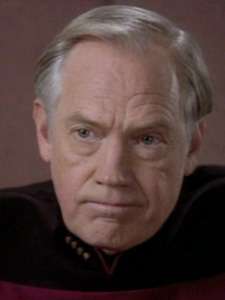
By-the-book Captain assigned by Admiral Nechayev to replace Picard. With tensions rising between the Federation and the Cardassians, Jellico was put in charge because of his military muscle. Because of Riker's close ties to Picard, he insisted on butting heads with Jellico in public until he was finally demoted and replaced by Data.
Despite all this, Jellico proved his worth by mounting a successful rescue of Picard, subduing an entire Cardassian fleet in the process.
- Bait and Switch Tyrant
- Catch Phrase: "Get it done." Spoken quite gruffly.
- Jerk with a Heart of Gold
- The Neidermeyer: YMMV on this one. Jellico was a military captain, but Starfleet - at least the Enterprise - is not military.
- We Hardly Knew Ye
K'Ehleyr (Suzie Plakson)
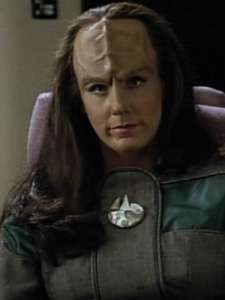
Klingon-Human hybrid and mother of Worf's child. Despite her occupation as Klingon Ambassador, K'Ehleyr never held much love for the old Klingon ways, often infuriating Worf. This flagrant defiance of tradition was eventually transmitted to her son. She was killed by Duras as penalty for snooping around his operation.
Lore (Brent Spiner)
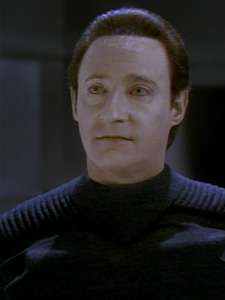
Psycho Prototype built by Dr. Soong and abandoned on a space colony. Though Lore initially claimed to have been an improvement over Data's model -- evidenced by full range of emotion -- the truth is that Lore came first, and was a total failure. Despite his emotions chip, he lacked empathy and considered himself superior to humans. His schemes usually revolve around controlling the Crystalline Entity, the giant creature which plagued Dr. Soong's colony, in order to wipe out organic life.
Lore came into contact with Hugh's Borg Collective and appointed himself leader. He attempted to brainwash Data to join him, but was beaten and dissembled into spare parts again, where he belongs. His damaged emotion chip was bequeathed to Data, who was too timid to try it on himself.
- Cain and Abel: Lore's appearances always come down to a personal confrontation between him and Data.
- Dark Messiah: To the Borg in "Descent".
- Evil Twin
- Fake Guest Star: Brent Spiner already plays Data.
- Freudian Excuse: Resents Dr. Soong for abandoning him, which resentment spills over onto all organic beings.
- Morality Chip: "Whoops, I knew I forgot something." -- Dr. Soong.
- Psycho Prototype
- Sarcasm Mode
- Spot the Impostor: Naturally, he impersonates Data at one point.
- The Unfavorite: In his own perception.
- Visionary Villain: In "Descent".
Alynna Nechayev (Natalia Nogulich)
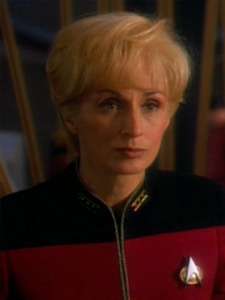
Hawkish Admiral and a perennial thorn in Picard's side. Nechayev is a firm believer in Federation security and openly scornful of anyone who acts contrary to it.
Picard wasn't the only one to suffer her wrath; Nechayev also appeared on Deep Space Nine to harass Commander Sisko. In a holodeck simulation constructed by the Dominion, Sisko was placed in a situation where Nechayev and the rest of Starfleet had fully capitulated to the Dominion's regime.
- Head-in-The-Sand Management: In Sisko's holodeck simulation. Nechayev, greedy for Dominion technology, helps paves the way for occupation of the Federation.
- Hair of Gold
- Iron Lady
- Mean Boss: Understandable given the circumstances. But some of her decisions were memorably harsh.
- Took a Level In Badass: Becomes head of Starfleet Intelligence in the Expanded Universe.
- Tsundere: Was tough as nails when she needed to be, but also had amicable social moments.
Q (John de Lancie)
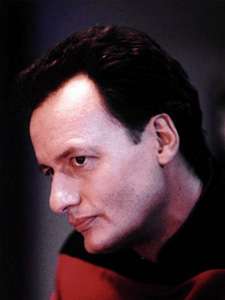
"I'm not good in groups. It's hard to work in groups when you're omnipotent."
Omnipotent prankster who belongs to the Q Continuum, a race of godlike aliens who live outside our plane of existence. Simultaneously the main 'villain' and Trickster Mentor of the series.
Q's pranks seems chaotic on their surface, but have a subtle purpose: namely, to humble the Federation, which in his view has grown too complacent. Q demonstrates this by warping the Enterprise light-years across the galaxy and dropping them in Borg space.
Q, who makes it his business to meddle in mortal affairs, seems to enjoy annoying Picard in particular. For his part, Picard is unsure whether Q has humanity's best interests at heart, or is simply a bored kid who tortures insects.
- Adult Child: He's an obscenely powerful, omnipotent deity who has the emotional development of a six-year old. This includes being hopelessly self-obsessed, never realizing how annoying people find him, pouting when things don't go his way or he is upset and generally acting like a spoiled child when it suits Him.
- Anti-Villain
- Ascend to a Higher Plane of Existence: more comes from a higher plane of existence to play with mortals, but the Q Continuum drags him back there when he's done enough damage for a millennia.
- Badass Finger-Snap: Practically a trademark of the character. He does this whenever he warps reality on a large scale.
- Bunny Ears Lawyer
- But for Me It Was Tuesday: you don't want this guy to get bored and then decide to make you his playmate.
- Character Overlap: has been in The Next Gen, Voyager, DS-9 and the expanded universe. Honestly, it was surprising that he didn't show up in Enterprise.
- Deadpan Snarker: All the time. Its one of the many reasons the crew doesn't like Him.
- Debt Detester: Specifically to Picard.
- Depending on the Writer: As SF Debris points out, Q was subject to schizophrenic characterization. He could either come off as detached and sinister ("Encounter at Farpoint", "Q Who", "All Good Things...") or wild and silly ("Hide and Q", "Q-Pid").
- There's a fan theory that he just gets Bored with Insanity from time to time. YMMV on whether him being insane is actually an improvement or not. The entire Q Continuum, though, seem to have a trait with Crouching Moron, Hidden Badass - they'll act friendly, mess around with you, but won't kill you... until you piss them off or annoy them enough for them to decide to squash you.
- This may be in part deliberate. In his first episode, he changes his appearance frequently, and while his personality remains that of an arrogant and judgmental deity, he behaves quite differently whenever he changes his look. From a superior french admiral to a drug-addled 21st century foot soldier.
- Divine Intervention: usually after he's actually started the problem and someone brow-beats him into cleaning up the mess he made.
- Even Chaotic Trickster Gods Have Loved Ones: he truly does love his wife and kid. Enough that hurting them is pretty much the only thing that can genuinely piss him off (and no, not annoy him so he turns you into a different creature, really piss him off).
- A God Am I: well, technically, he's right, but he tends to rub people's noses in it.
- Great Gazoo
- Insufferable Genius
"I'm not interested in human interpersonal relationships. I just want to prove to Picard that I'm indispensable."
- It's All About Me: He expects the enterprise to drop everything else when is around or requires Their help. Even the potential destruction of a planet or a crew member sacrificing himself for Q won't stop his selfish attitude.
- Jerkass
- Jerkass God: he's done some really mean things to people on a whim. And a lot of these were rather deadly practical jokes (on the scale of wiping out entire civilizations)
- Jerk with a Heart of Gold: At times. Such as warning the crew of the Borg a year before it would become a major problem.
- 18 people lost their lives during that "warning". A heart of gold is very debatable here.
- Large Ham
- Living Forever Is Awesome: Opinion of his race as a whole but Q in particular believes this trope. One of the most severe punishments they have (And sentenced Q to once) is to make one of their own mortal.
- A Million Is a Statistic: Sort of, in "Q Who?"
Picard: I understand what you've done here, Q. But I think the lesson could have been learned without the loss of 18 members of my crew.
Q: If you can't take a little bloody nose, maybe you ought to go back home and crawl under your bed. It's not safe out here. It's wondrous, with treasures to satiate desires both subtle and gross... but it's not for the timid.
- No Sense of Personal Space: One-ups every other Star Trek example by teleporting into Picard's bed.
- Also has a history of hitting on Janeway during most of their encounters.
- One-Letter Name
- Physical God
- Real Life Relative: Q Junior is played by Keegan de Lancie.
- Reality Warper: Q powers tend to take this form, changing things in a flash of light with a signature sound effect.
- Really Seven Hundred Years Old: He's immortal and was present at the beginning of the Universe yet still looks like a middle aged man.
- Shapeshifter Default Form: A human John de Lancie in a Starfleet captain's uniform. Failing that, the uniform of a high-ranking officer in another military force.
- Slouch of Villainy
- Story-Breaker Power: he's a Q. The words "omniscient and omnipotent" belong somewhere in the species description.
- Sufficiently Advanced Alien: every member of the Q Continuum (minus Q's son) was present at the beginning of the universe. They are very advanced. Which just gives added props to the humans who decide to take a swing at him (Ben Sisko, anyone?).
- Super Empowering: To Riker, and in a novel, Lwaxana Troi. The former gives them up to avoid Power Corrupts. The latter turned out to be an incredibly bad idea on Q's part.
- Trickster Archetype: according to some of the semi-canon novels, he's the Ur example for this trope in-universe (with basically every Trickster god, alien and human (including Loki and Prometheus (where the Q Continuum literally strung him out on a cliff and had wild animals eat out his internal organs repeatedly for giving humans the gift of fire on a whim)) being based in some shape or form on him... and for good reason).
- Trickster Mentor: Q's actions ultimately help Picard every time he shows up, and ultimately help humanity. He challenges morals, ethics, thoughts, ideas of what we would do for power, who we are and what we could change, as well as the nature of existence. "Tapestry" suggests him to be amused enough by Picard to save his life. "Q-Who" suggests, even at his worst, throwing the crew into their first encounter with the Borg, he's making sure they have enough experience to be prepared.
- Unreliable Narrator: you think he's bad in the series? Wait until you read some of the books written in the first person narrative.
- "Well Done, Son" Guy: Q's a lousy parent, but that's not saying much; he's the first Q in history to conceive a child.
- Well-Intentioned Extremist
Commander Sela (Denise Crosby)
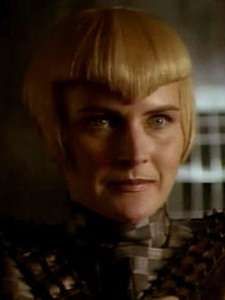
Illegitimate half-Romulan daughter of Tasha Yar. A major player in the Romulan plot to smash up the Federation-Klingon alliance.
- Blondes Are Evil: She inherited Tasha's Hair of Gold, and is notable for being the only blonde Romulan ever shown.
- Emerging From the Shadows: Her reveal shot.
- Half-Human Hybrid: The child of Tasha Yar (from an alternate timeline) and a Romulan man.
- Identical Daughter
- You Look Familiar: Played by Denise "Tasha Yar" Crosby.
Noonian Soong (Brent Spiner)
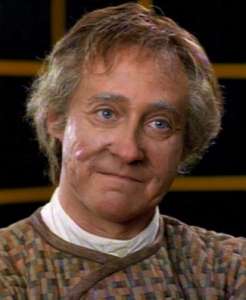
Mad scientist and creator of Data and Lore. When his theories on artificial intelligence were scoffed at by his peers, Soong left Earth and settled on a space colony to continue his research.
Data occasionally has visions of Soong, who encourages him to continue pushing the boundaries of his programming. Soong finally reunited with his 'sons' as an old man, but was killed by a vengeful Lore.
- As Long as It Sounds Foreign: A blue-eyed white man with an American accent, an Indian first name, and a Chinese surname.
- It if sounds clunky, it's because "Noonian Soong" is a play on Khan Noonien Singh.
- Fake Guest Star: Brent Spiner already plays Data.
- For Science!: Soong was obsessed with creating fully sapient mechanical beings -- not as a labor force or an improvement on existing life forms, but to prove it could be done.
- Generation Xerox: Star Trek Enterprise shows us Dr. Arik Soong, an ancestor of his who was also obsessed with an impractical technology, in his case Bio Augmentation...
- Identical Grandson: ...also played by Spiner.
- Mad Scientist: Of the good-but-obsessive sort.
- Never Found the Body: Was assumed killed when the Crystalline Entity attacked his colony.
- Posthumous Character: Makes at least two appearances this way, in a dream of Data's and a holoprogram coded into the android duplicate of his wife.
- They Called Me Mad: Once considered a promising cyberneticist, Soong was laughed out of scientific circles for failing to deliver on his theories. Among his collegues, he was nicknamed "Often-wrong".
Ambassador Spock (Leonard Nimoy)
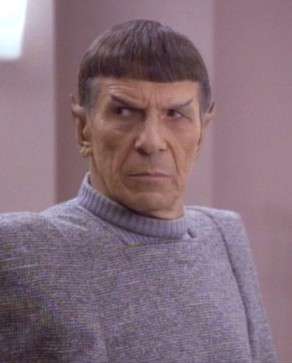
Needs no introduction.[context?] Currently,[when?] Spock serves as the Vulcan Ambassador to Romulus, hoping to broker peace between the two worlds. His rebellious streak (inherited from Kirk) is still in full bloom.
Commander Tomalak (Andreas Katsulas)
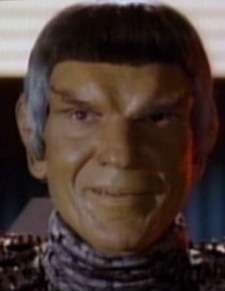
Crafty Romulan commander who is usually up to no good.
- Hey, It's That Guy!: You might know him better as Ambassador G'kar from Babylon 5.
- He was also the One-Armed Man in the film version of The Fugitive.
- Smug Snake: At least when he's winning. Which rarely lasts long.
Lwaxana Troi (Majel Barrett Roddenberry)
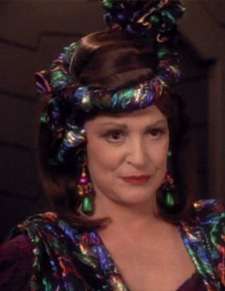
Widowed mother to Troi and Federation Ambassador to Betazed. The encroachment of middle age causes Lwaxana to 'overcompensate' in some ways - namely, making sexual advancements on anyone with a pulse. She repeatedly tried to seduce Picard, usually dragging him into saving her from plights of her own making.
Lwaxana later crossed over to Deep Space Nine, where her stalker tendencies promptly shifted to Odo.
- Abhorrent Admirer: Lwaxana is constantly flirting with Picard. He is not pleased.
- Amazingly Embarrassing Parent
- Blue Blood: Though a surprisingly good diplomat when she bothers to concentrate on the job, Lwaxana's life and self-concept are entirely based around being a member of the Betazoid elite.
- Cloudcuckoolander
- Descended Creator: Sort of. She owned a great deal of the rights and was one of the chief executives owning Star Trek after her husband's death.
- Fake Guest Star: Majel Barrett Roddenberry voiced-acted every Federation computer in Next Gen (and for that matter DS 9 and Voyager), and was only a "guest star" here in the sense that she physically appears in the episode. As the computer, they even managed to squeeze her into Star Trek Enterprise ("In A Mirror, Darkly") and the 2009 preboot (very shortly before her death), making her the only person to be involved in every incarnation of the franchise.
- The Fashionista
- Genki Girl: Always friendly, always cheerful, always enthusiastic, even to the point of annoying people around her.
- Good Bad Girl: Since her husband died, she always seems to have Mr. Fanservice on her arm or is on the lookout for it.
- Grandma, What Massive Hotness You Have!
- Hoist By Her Own Petard: She's a constant pain in the side of Captain Picard for pushing herself onto him and never taking no for an answer. In the episode Menage A Troi, she's pursued by a Ferengi captain that she finds utterly repulsive, but he's captivated by her beauty. So much so that he kidnaps her and forces her to wait on him.
- Hot Mom
- Impossibly Low Neckline: Subverted Trope in that her cleavage has noticeably sagged.
- I Want Grandkids: She simply can't wait for Deanna to give her a few children and is rather disappointed she decided to settle on a professional career in Starfleet.
- Ms. Fanservice: Like her daughter, but especially for those who like older women.
- My Beloved Smother: Lwaxana is often a bit too involved in Deanna's business.
- My Biological Clock Is Ticking: Towards Picard. And it's hilarious.
- Pimped-Out Dress
- Socialite
- Stepford Smiler: As shown in "Dark Page".
- Talking to Herself: When using the ship's computer.
- Telepath: A full telepath and Empath, unlike her daughter Deanna who is mainly an empath and only rare telepath. Lwaxana can talk mentally to nearly any species (except Ferengi and a few others), while the only non-empath Deanna is ever shown talking mentally to is Will Riker.
- Try to Fit That on A Business Card: Lwaxana Troi, Daughter of the Fifth House, Holder of the Sacred Chalice of Rixx, Heir to the Holy Rings of Betazed.
- Widow Woman
- You Look Familiar: Hey, it's Nurse Chapel!
- Back to Star Trek: The Next Generation
- ↑ and because Status Quo Is God
- ↑ ...who works on a starship. Figure that one out.